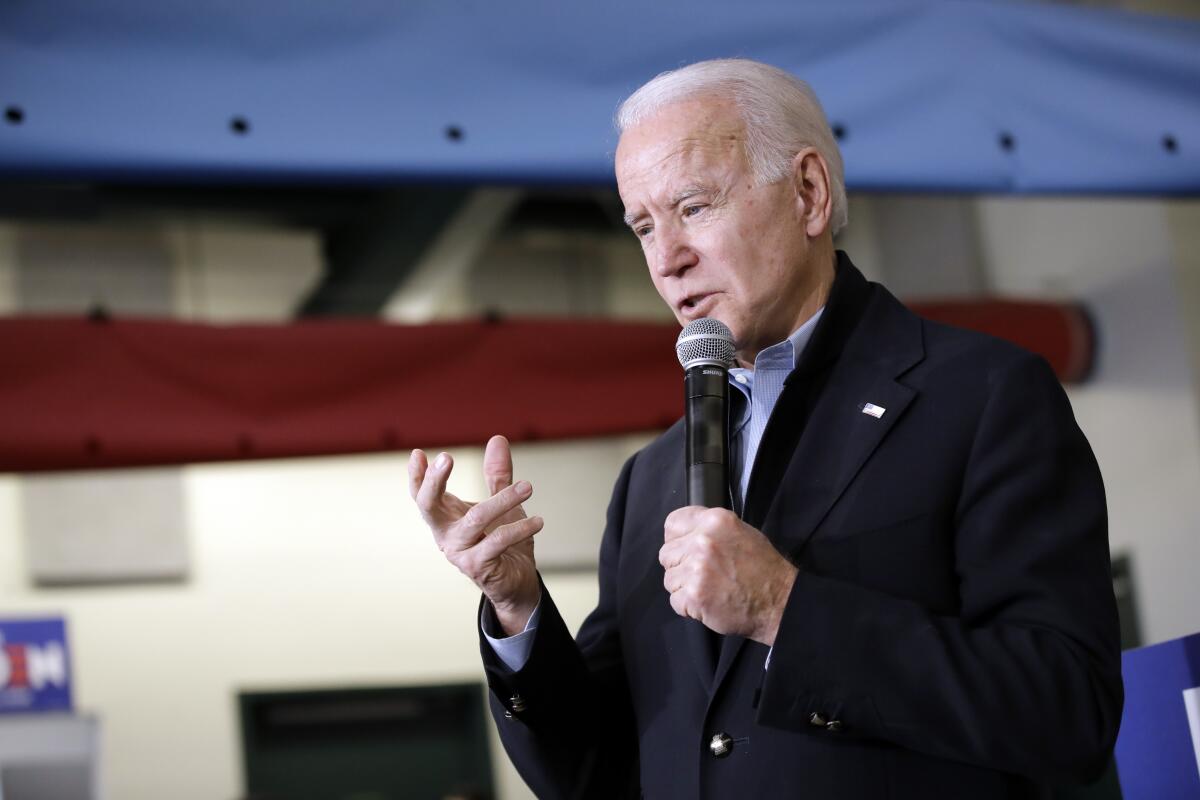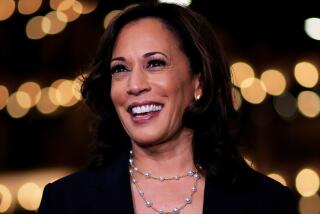Op-Ed: Will party insiders push Biden to victory in the Democratic primaries?

- Share via
The Iowa caucuses are next week, and Super Tuesday is a little more than a month away, but there are plenty of signs that party insiders have settled on a candidate: Joe Biden.
Why should we care about what party insiders think? Most of the time their opinions matter; when they settle on a candidate they like, that person usually wins the nomination, even if they’re not the initial favorite in the polls. And when party insiders don’t back someone, it can help drive that person out of the race.
Party insiders rallied strongly for Hillary Clinton in 2016, which discouraged many others from entering the contest and helped her win the Democratic nomination, despite losing the New Hampshire primary to Bernie Sanders and basically tying with him in the Iowa caucuses.
Of course, these trends didn’t hold for the Republicans in 2016. The party insiders didn’t settle on a favorite candidate, and Donald Trump won the nomination with very little insider support. It’s an open question what will happen this year on the Democratic side, given that, despite insider signals, Sanders goes into Iowa, New Hampshire and some Super Tuesday states ahead in the polls.
But the overall signal conveyed by party insiders is that Biden is the one to watch. This doesn’t mean that he’s the consensus candidate or that the party is enthusiastically behind him. But he does have at least as much support as previous Democratic nominees had at this point in the race, and quite a bit more than others, according to some important milestones.
One measure is endorsements, though there are different ways to weigh the value of specific endorsements. FiveThirtyEight, for example, counts governors, members of Congress and state legislative leaders and uses a point system based on the prominence of the endorser. Using that tracker, Biden is well ahead of the rest of the pack, with over 230 endorsement points. Elizabeth Warren is in second place with about a third of that number. Sanders has fewer than 60 points.
By this point in their races, Hillary Clinton in 2016 and Al Gore in 2000 had each garnered a lot more endorsement points (458 and 371, respectively). But Biden is ahead of where Walter Mondale (204 points), Bill Clinton (176 points), Barack Obama (76 points) and John F. Kerry (29 points) were two days before the Iowa caucuses. And looking across parties, Biden isn’t as supported by his party insiders as George W. Bush and Bob Dole were, but he is doing better than others, including John McCain, Ronald Reagan and George H.W. Bush.
A separate analysis of endorsements by Georgetown political scientist Hans Noel, which includes interest group leaders, labor unions and others besides Democratic officeholders, has Biden in the lead, with Bernie Sanders a distant second. Political scientist Boris Shor, who has been tracking endorsements by state legislators, also has Biden in the lead, with Warren pulling about half as many endorsements.
What about campaign donations? Sanders is far ahead in any tabulation of the overall number of donors or amounts raised. He raised $34.5 million in the fourth quarter from 1.8 million donations. But historically, overall donation amounts in primary races tend to be less predictive of who wins the nomination than donations from people who have a history with the party or also donate to it. People who donate to Democratic Party organizations and to presidential candidates largely prefer Biden and Warren.
As for activist support — the kind of support candidates need to put together field teams and functional campaign offices around the country — my interviews with Democratic activists in the early primary states and Washington, D.C., show that Biden has recently emerged as one of their top choices, while Warren is losing some of her lead. Even Biden’s detractors seem a bit less vocal now.
In many ways, Biden is an easy call for the party establishment. He’s universally known, attached to a popular former administration, and roughly in sync ideologically with much of the party. Rightly or wrongly, he’s overwhelmingly perceived as electable and does well in polling matchups with Trump.
But it’s not clear primary voters will actually ratify the establishment favorite. Hillary Clinton prevailed in 2016 with insider support, but Sanders did far better in that contest than observers expected, with no party support at all. Biden’s supporters might not be as enthusiastic, and his overall national polling lead has been shrinking as Sanders’ support has been expanding. Beyond that, it’s possible that party voters just don’t respond as readily to insider signals as they used to.
FiveThirtyEight currently gives Biden a 1 in 2 chance of winning the Democratic nomination — substantially better than any other candidate’s chances — but this estimate is based on polling that will shift around a lot depending on what happens in the first few February contests and which other candidates drop out.
The 2008 Democratic contest changed significantly once Obama won the Iowa caucuses and proved he could deliver votes; a number of party insiders shifted his way after that.
Biden could underperform, even with party insider backing. It depends on whether primary voters are less interested in what the party has to say than they used to be.
Seth Masket is a professor of political science and director of the Center on American Politics at the University of Denver.
More to Read
A cure for the common opinion
Get thought-provoking perspectives with our weekly newsletter.
You may occasionally receive promotional content from the Los Angeles Times.










